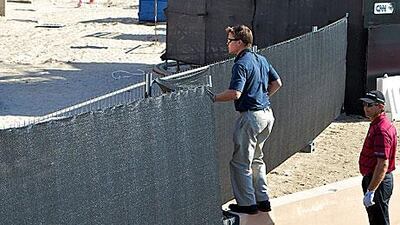It was one of the easier calls Barney Coleman had to make at the Dubai World Championship.
From his vantage point on top of a wall and peering over a fence, he could clearly see that Retief Goosen had gone out of bounds with his approach shot to the 18th green on Saturday.
The two-time US Open champion's ball had landed in the garden of one of the unfinished villas that sit alongside that fairway of the Earth Course.
Coleman is, of course, well qualified to make far more dificult decisions as an expert on the rules of golf. He and Buddy Morin, who both live in Dubai, have studied the game's 34 rules and the 1,200 different decisions pertaining to those regulations.
Which is why they were among a seven-strong team of referees over the four days at the Jumeirah Golf Estates who were ready to answer any queries.
Not all their decisions, of course, cost the players.
"I made a ruling on the first day for David Horsey that he could take a drop because there was a water hose, or immobile obstruction as we call it, in his way," Morin said.
"It's a small thing, but, again, when a professional is playing for so much, you need to get every detail right."
Morin and Coleman, who are both keen players themselves and boast a handicap of six, have plenty of experience having officiated at the Dubai Desert Classic.
Morin, an international sales manager for a US company, was a referee at this year's Abu Dhabi Golf Championship.
"It was a privilege to watch the best players in the world so close up," said Morin, a 54-year-old Canadian who studied the rules of golf at the R&A referee school in St Andrews, Scotland.
"I'm there to do a job, but I also get to watch these guys in action and try to pick up tips. We would love to be as good as them one day, but know that's not going to happen. It's why we become referees."
And had some obscure ruling partially slipped their minds, Coleman and Morin knew a man who would put them right.
"We all work really closely as a team and if there was any dubiety on the ruling, then we contacted Andy McFee, who was the chief referee and, together, we would work out what had to be done," said Morin.
Not one of the 58 players had any negative comments about the organisation of the European Tour's grand finale.
And the referees who work long hours to ensure no player's round is ruined because of a rule violation are a massive part of any golf tournament's success.
"A lot of spooky stuff can happen on a golf course, so we need to be there, on the spot, for any issue either big or small. The players want to get it right, because they are playing for a lot of money," said Morin.
"And if we think we don't quite have all the options covered, then we seek advice over the radio, and make sure that it is right, that's the key thing. If it takes an extra minute or two just to get something right, then that's what it takes."
Coleman, a 32-year-old golf services manager at Emirates Golf Club in Dubai, has officiated in the UK and the UAE, and was called into action on Friday, not for an infringement or ruling, but for some much-needed repair work.
"Ross Fisher's ball actually damaged the first hole, when he almost eagled it, so I had to fix that with a putter to smooth it off, and get it back to its original state," he said. "It might not sound much, but you can't have such a big championship with the first hole damaged."
The referees have to be on the course all day, and in Dubai that meant from when the first group teed-off at 7.40am until the final putt dropped.
They are scattered all over the course, and while they get a specific run of holes to patrol, all of them, the others being Neal Briggs, Gary Tait, Kevin Feeney and Paul Cargill, can walk many miles when on duty.
"The alarm went off at 6am and then I got home 12 hours or so later, so they are long days. Don't worry, we do a bit of sitting," said Coleman.

